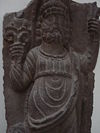Dusarès — Dusares Dusares est un dieu des Nabatéens, peuple arabe de l Antiquité qui vivait en Jordanie, au nord de l Arabie et dans le Negev à partir du IVe siècle av. J. C.. Dusarès est la transcription en latin du nom arabe dhû Sharâ :… … Wikipédia en Français
Dusares — Dusares, aussi connu sous les noms de Đū Shará ou de Orotalt, est un dieu des Nabatéens, peuple arabe de l Antiquité qui vivait en Jordanie, au nord de l Arabie et dans le Negev à partir du IVe siècle av. J.‑C.. Dusarès est la… … Wikipédia en Français
Dusares — (eigentlich Dhu sch Schara), arab. Götze, bekannt namentlich als Stammgott der Nabatäer (s. d.), hatte ein Idol u.a. zu Petra in einem 4 Fuß hohen und 2 Fuß breiten Stein, über dem ein Tempel stand; hier wurde jährlich am 25. Dez. seine Geburt… … Meyers Großes Konversations-Lexikon
Dusares — [arabisch »der von Schara«, d. h. vom Gebirge zwischen Totem und Rotem Meer], der in der römischen Provinz Arabia, besonders in Petra, verehrte Stammesgott der Nabatäer. Sein »Bild« war dort ein schwarzer, viereckiger Stein auf goldener Basis.… … Universal-Lexikon
Dushara — Dusares Dusares est un dieu des Nabatéens, peuple arabe de l Antiquité qui vivait en Jordanie, au nord de l Arabie et dans le Negev à partir du IVe siècle av. J. C.. Dusarès est la transcription en latin du nom arabe dhû Sharâ :… … Wikipédia en Français
Khaabou — Chaabou (perhaps the original etymological version of the Arabic word Ka bah) is the name of one of the Goddesses in the Nabataean Pantheon as noted by Epiphanius of Salamis (c.315–403). The description either points to Allat or Uzza, but is most … Wikipedia
Dushara — Myths of the Fertile Crescent series Mesopotamian mythology … Wikipedia
Orotalt — Myths of the Fertile Crescent series Mesopotamian mythology … Wikipedia
NABATEANS — NABATEANS, ancient people in the Middle East. Originally a pastoral, nomadic people, the Nabateans became merchants in the trade of oils, aromatics and spices, frankincense and myrrh from southern Arabia. By the second century B.C.E., they… … Encyclopedia of Judaism
Decapolis — For other uses, see decapolis (disambiguation). Decapolis region (yellow)) The Decapolis ( Ten Cities ; Greek: deka, ten; polis, city) was a group of ten cities on the eastern frontier of the Roman Empire in Judea and Syria. The ten cities were… … Wikipedia

